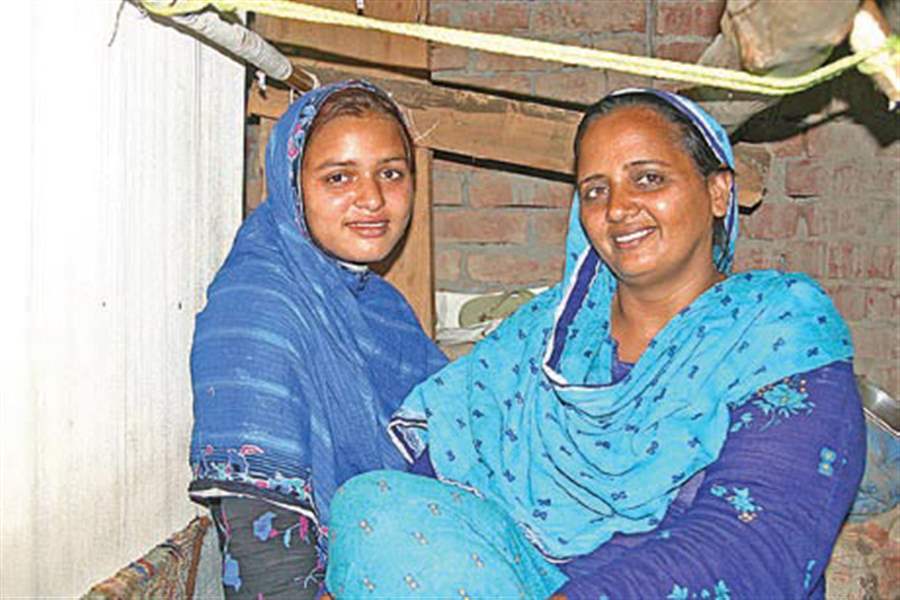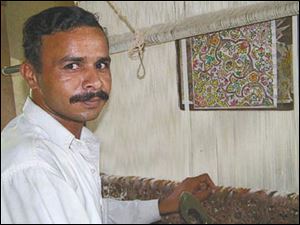
Rugs to riches
Ten Thousand Villages to host its first fair trade oriental rug event in Archbold, Ohio
10/5/2011
With looms in the homes of artisans, rugmaking gives women opportunities to generate income while tending to their children and homes.

After his home was destroyed by flood waters, Mohammad Mushtag knots rugs in a short term facility built by Bunyaad, the fair trade artisan group. The foundation also helps artisans rebuild their homes.
Mention Pakistan and the likely consideration is the tension between it and India, that it's a terrorist state, and it's the country where Osama bin Laden was finally killed by U.S. special forces.
However, most of the 187 million Pakistanis have nothing to do with the daily headlines. Instead, they are actively engaged in trying to make a living, some by selling beautifully handmade rugs that allow them the ability to earn income, own a home, and educate their children.
Beginning at 9:30 a.m. Wednesday through Saturday, Ten Thousand Villages at 1201 South Defiance St. in Archbold, Ohio, will host its first fair trade oriental rug event, featuring 300 rugs designed by 850 Pakistani artisan families who make the rugs in their village homes.
Potential buyers will learn the origin and care of these heirloom-quality rugs that won't need cleaning for three or four decades at a seminar tomorrow night.
The wool comes from sheep that have additional fat on their tails, providing the raw material for the fabric with additional oil and lanolin. Villagers use natural products such as tree bark, pomegranate shells, eggplant, and walnut shells to dye the wool, giving it a rich, natural appearance.

Several family members work for months together to complete a single rug, using their hands to tie from 500 to 800 knots per square inch, according to Yousaf Chaman. He is the director of Bunyaad -- which means "foundation" in Urdu -- the organization that ensures that artisan families are paid a fair wage in an attempt to secure peace in Pakistani villages.
Mr. Chaman, whose family history is steeped in many generations of rug-making, was born and raised in Pakistan.
"I was 4 years old when I saw my father and uncle making rugs," he recalled. He learned the art of rug-making and has been involved with this program for more than 20 years.
A family's goal is to make rugs with designs that are not repeated, he said. That's why a family only makes so many rugs.
"Most artisans have five or six" design ideas, Mr. Chaman said. To make "a 9-by-12 rug takes up to 14 months, with four or five people working on the rug. A family unit wouldn't produce more than 16 rugs; they want those rugs to be one-of-a-kind.
"It is a unique art and it is a great pride that the artisans have, and it is because of that that if they can earn a fair income they want to produce those unique rugs. They want to share that pride with the rest of the world," he said.
His remarks help explain the rugs' cost. Darlene Rohrer-Meck, manager of Ten Thousand Villages in Archbold, said a small rug can cost $125. A 5-by-6-foot rug could cost from $1,300 to $2,800. Expect to pay from $6,000 to $10,000 for a 10-by-14 foot rug, she said.
"The prices are affected by the size, type of rug, whether it's all-natural dye versus a commercial dye, and knots per square inch," Ms. Rohrer-Meck said. "So the higher the knot count, the more expensive it will be."

With looms in the homes of artisans, rugmaking gives women opportunities to generate income while tending to their children and homes.
And not every item is to be walked on. The inventory will include table runners, small pieces that can be placed under centerpieces, wall hangings, and tapestries with varying prices that could range up to several hundred dollars.
This effort is far more than purchasing oriental rugs from Ten Thousand Villages to invest in the beauty of an individual home: It is an investment in bringing peace to a people, liberating their women, empowering their men, and educating their children.
While Ten Thousand Village stores are fair trade retailers that sell products from Third World nations, the fair trade effort lets those people work from their homes where they can build community foundations, feed their families, have good living conditions, and pass opportunities on to younger generations.
"It lets men and women have opportunities that wouldn't [otherwise] be possible," Ms. Chaman said. "In most cases, artisans are told what design to create, but in this case, they come up with their own design."
Pakistani artisans are fully paid before a rug leaves their homes. The project is so successful that urban dwellers are returning to villages, Mr. Chaman said, simply because the work permits a way to own a home, have three meals a day, and to send children to school.
"The fair-trade model is a complete solution to economic, social, and even political problems in many parts of the world," he said.
The fair-trade diplomacy effort begins at 9:30 a.m. daily and will run through 7 p.m. today and Friday; 9 p.m. tomorrow, and 3 p.m. Saturday.
Archbold's Ten Thousand Villages store is also the location of a seminar on oriental rugs tomorrow at 7 p.m. To register for the seminar, call the store at 419-445-1926 or visit rugs.tenthousandvillages.com, go to Archbold and follow the prompts.
Contact Rose Russell at rrussell@theblade.com or 419-724-6178.